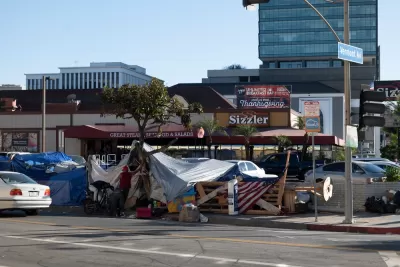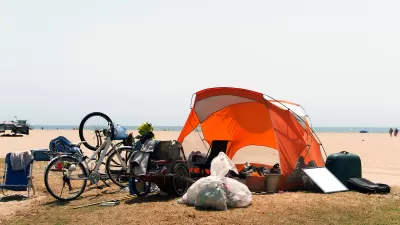The city of Los Angeles is scrambling to keep up with its growing homeless population, and increasingly leaning on punitive measures in response to the crisis.

“The Los Angeles City Council on Tuesday instructed its lawyers to draft a major change to the city’s anticamping ordinance, barring homeless encampments within 500 feet of schools and daycare centers,” report Benjamin Oreskes and David Zahniser for the Los Angeles Times.
The ordinance is in motion after Alberto M. Carvalho, superintendent of the Los Angeles Unified School District, urged the City Council to adopt the measure.
According to the article, the ordinance is caught up in the politics of the local election set for June 7. All of the councilmembers currently in contested races for re-election voted in support of the ordinance.
Oreskes and Zahniser also report that the ordinance “would represent a dramatic shift in the city’s approach to homeless encampments, rewriting a key aspect of an ordinance that was finalized only last summer following weeks of contentious debate.”
“The existing anticamping ordinance allows the council to prohibit camping on sidewalks around parks, libraries and schools. However, enforcement cannot occur until the council has reviewed a specific location and voted to give the go-ahead to clear it,” explain Oreskes and Zahniser.
A recent Times investigation revealed uneven enforcement of the measure. Los Angeles, home to the largest population of people experiencing homelessness in the United States, has been struggling to find the resources to support their city’s most vulnerable residents. A controversial decision to forcibly remove a homeless encampment from around Echo Park Lake in spring of 2021 still reverberates through the politics of the city. While the city has made progress in creating tiny home villages for people experiencing homelessness, advocates question the effectiveness and the conditions of the villages.
FULL STORY: L.A. City Council seeks to ban homeless encampments near every school, daycare center

Study: Maui’s Plan to Convert Vacation Rentals to Long-Term Housing Could Cause Nearly $1 Billion Economic Loss
The plan would reduce visitor accommodation by 25,% resulting in 1,900 jobs lost.

Alabama: Trump Terminates Settlements for Black Communities Harmed By Raw Sewage
Trump deemed the landmark civil rights agreement “illegal DEI and environmental justice policy.”

Why Should We Subsidize Public Transportation?
Many public transit agencies face financial stress due to rising costs, declining fare revenue, and declining subsidies. Transit advocates must provide a strong business case for increasing public transit funding.

Paris Bike Boom Leads to Steep Drop in Air Pollution
The French city’s air quality has improved dramatically in the past 20 years, coinciding with a growth in cycling.

Why Housing Costs More to Build in California Than in Texas
Hard costs like labor and materials combined with ‘soft’ costs such as permitting make building in the San Francisco Bay Area almost three times as costly as in Texas cities.

San Diego County Sees a Rise in Urban Coyotes
San Diego County experiences a rise in urban coyotes, as sightings become prevalent throughout its urban neighbourhoods and surrounding areas.
Urban Design for Planners 1: Software Tools
This six-course series explores essential urban design concepts using open source software and equips planners with the tools they need to participate fully in the urban design process.
Planning for Universal Design
Learn the tools for implementing Universal Design in planning regulations.
Smith Gee Studio
Alamo Area Metropolitan Planning Organization
City of Santa Clarita
Institute for Housing and Urban Development Studies (IHS)
City of Grandview
Harvard GSD Executive Education
Toledo-Lucas County Plan Commissions
Salt Lake City
NYU Wagner Graduate School of Public Service





























